1Gbps delivered by Google, not AT&T. Of course.
Google picked Kansas City for the Google Fiber Project and said it would roll out the 1Gbps internet access there first. Kansas City, KS was picked out of about 1,100 candidates. The connections should go live in 2012 as long as the Board of Commissioners signs onboard.
Google also said they haven’t ruled out other cities getting Fiber either, thankfully.
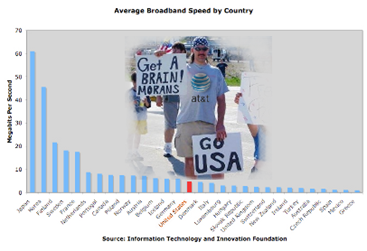 The project is designed to be a real world test of the future of high speed Internet connections. 1Gbps is many times faster than even some of the best broadband in the United States. These types of speeds are normal in Asian Pacific countries, like South Korea.
The project is designed to be a real world test of the future of high speed Internet connections. 1Gbps is many times faster than even some of the best broadband in the United States. These types of speeds are normal in Asian Pacific countries, like South Korea.
In North Carolina, companies like AT&T, CenturyLink, and Time Warner Cable are lobbying the state legislature to try and get a law passed to block municipalities from doing this for their citizens. It hasn’t got past the NC Senate yet, but just passed the NC Congress.
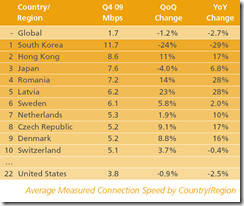 I’m a believer in free markets as much as the next guy, but if anyone thinks I’m talking about a free market they’re fooling themselves. We have x-opolies in control. Just look at AT&T’s acquisition of MetroPCS. Sprint doesn’t like it, of course. Verizon doesn’t really care because they’ve got something else up their sleeve. Mobile service in the United States, if the acquisition goes through, will really be down to just a handful of companies.
I’m a believer in free markets as much as the next guy, but if anyone thinks I’m talking about a free market they’re fooling themselves. We have x-opolies in control. Just look at AT&T’s acquisition of MetroPCS. Sprint doesn’t like it, of course. Verizon doesn’t really care because they’ve got something else up their sleeve. Mobile service in the United States, if the acquisition goes through, will really be down to just a handful of companies.
AT&T was broken up in 1974 and we in the U.S.A. saw some great years of innovation and telecommunication expansion. We’re headed right back to where we were, but this time the CEOs are smart enough to know when to stop. They’re point at each other and cry “see! there’s competition!” while they simultaneously pay big lobbying firms to ensure laws are passed to prevent anyone else from entering their market.
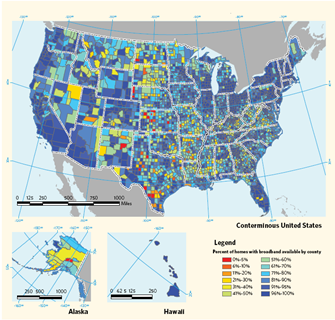 It is not a coincidence that most of us only have two broadband choices in our homes. Cable and DSL. By keeping the prices relatively the same and offering relatively the same bandwidth, locations that could easily have must faster speeds don’t because the poor infrastructure put in years ago is being milked for everything it is worth.
It is not a coincidence that most of us only have two broadband choices in our homes. Cable and DSL. By keeping the prices relatively the same and offering relatively the same bandwidth, locations that could easily have must faster speeds don’t because the poor infrastructure put in years ago is being milked for everything it is worth.
If Google pulls this off, people will witness firsthand what AT&T, Time Warner, and the rest doesn’t want you to know. That all this talk about throttling bandwidth, introducing tiers, and charging higher rates so they can more effectively ration bandwidth is a whole convoy of bull.
Don’t you believe any of it for one second. They’re making enough money to buy MetroPCS but they can’t afford to buy faster routers to handle more bandwidth? Yes, it costs money to take advantage of all that dark fiber laying around. Maybe instead of selling it AT&T could use it for their Internet service? Instead of expanding infrastructure, they want to charge us all more to use what’s there.
Just remember that AT&T sells unused fiber optics the next time you see them on capitol hill bitching about how much Netflix bandwidth they’re having to carry over their backbone. Remember that when your representative government says AT&T have the right to throttle your Internet connection because they want you going to AT&T Uverse portal instead of Netflix, on what premise such decisions were made.
Remember this when your ISP charges you a higher premium for using a competitor’s online service on your broadband connection instead of the optional (yet inferior) one they offer for a small subscription fee.
Top Four ways to protect yourself from NFC hackers.
NFC is an acronym for Near Field Communication. It’s a fancy way of describing radio frequency based communication over a very short distance. If you grew up in the 80s and ever got some of those really cheap CB walkie-talkies, you know a thing or two about RF over short distances.
 With NFC, we’re talking about 20 centimeters. The idea being that by putting your phone so close to a reader, you’ll be able to buy movie tickets, pay for your subway fare, or redeem the latest groupon. In fact, one really cool thing is this technology has the capability to turn us all into master coupon gurus! Who says you are only going to redeem one coupon?
With NFC, we’re talking about 20 centimeters. The idea being that by putting your phone so close to a reader, you’ll be able to buy movie tickets, pay for your subway fare, or redeem the latest groupon. In fact, one really cool thing is this technology has the capability to turn us all into master coupon gurus! Who says you are only going to redeem one coupon?
NFC works by taking advantage of induction. Induction is how the wireless charging stations work. They generate a magnetic field that creates a current in devices within that field. Like those fluorescent lights in that picture. They are stuck in the ground and are lit by the electromagnetic field generated by the power lines above them. In NFC, there are two players involved, the initiator and the target. Only one has to be powered for NFC to work, but they can both be powered. When only one is powered, it creates a field strong enough to power the other for the data exchange to take place.
Communication happens in two modes: passive and active. In passive, the initiator provides a carrier field and the target device answers. Basically, the target acts as a transponder and will generate a reply with power it gets from the field generated by the initiator. This is very similar to RFID. In fact, NFC is compatible with passive RFID infrastructures. In active mode, the two NFC chips communicate back and forth and exchange data. They can transmit and receive at the same time, so data exchange is very quick.
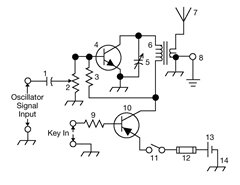 In effect, when any two NFC chips get close to each other they begin to transmit and receive data. With phones, the data transmitted can be just about anything. The data transmitted should be encrypted as it could contain your credit card number, your health records, the code to unlock the front door of your home, the code to disable your security system, the code to unlock your gun safe, the code to login to your bank account, or the code to start your car. With NFC, all of this information may soon be transmitted through thin air; albeit over very short distances.
In effect, when any two NFC chips get close to each other they begin to transmit and receive data. With phones, the data transmitted can be just about anything. The data transmitted should be encrypted as it could contain your credit card number, your health records, the code to unlock the front door of your home, the code to disable your security system, the code to unlock your gun safe, the code to login to your bank account, or the code to start your car. With NFC, all of this information may soon be transmitted through thin air; albeit over very short distances.
One thing about NFC that I wonder is just how secure will it be? According to the Wikipedia article on NFC, it is already vulnerable to 5 potential attacks. Eavesdropping via a powerful antenna, data modification through interference, Relay Attack where your phone would act as a middle man and pass the transaction on to the next person in line, being lost by the user, and walk off which is a valid transaction that has not been completed but the customer walks off. I find it interesting that NFC isn’t even out yet and there’s already an tool to execute a relay attack.
If you had the relay attack app on your phone, all you need is to be close to someone else and you could just charge that person’s credit card instead of yours. They only have to be close enough.
If you think back to when RFID was introduced, the “experts” all told us how one had to be close to read the chips embedded in credit cards. RFID was secure, and consumers had nothing to worry about. Does anyone remember this?
Now, we get to watch guys like Chris Paget drive around San Francisco cloning the RFID in passports. You should watch this. No Seriously, watch it and listen to this guy; he is not lying. Remember, RFID was sold as secure to the general public.
Now, NFC is coming and the hype is going to be unbelievable. Commercials will run showing attractive people living a harmonious life because they can pay for lunch at a street side bistro with their phone. You’ll be told its secure because the waiter won’t carry your credit card around the corner where you can’t see it. That kind of thing has already started convincing you what a great thing this is.
What they don’t mention is the criminal across the street could be scanning your driver’s license and your credit cards, and then intercepting the NFC conversation and cloning all this information for a quick and dirty spending spree. A real thief (or worse) may pick up your RFID hotel room key. Get ready for home invasion, vacation style.
Why would the credit card companies want you to adopt this technology? Because they wouldn’t have to send you a card, that’s why. No manufacturing of the card, no physical security around that process, no mailing of the card and the costs and risks around that. None of it. Instead, they can just allocate you a number and use that inside an app. The financial savings will outweigh all the losses they experience due to theft.
Some of you may dismiss my concerns as fear mongering. However, as a technologist, I have witnessed too many technologies purported to be secure get hacked and broken. DVDs, Game Consoles, SSL, GSM – they have all had their secure encryption broken. Even Apple’s encryption has been broken.
Thus, I offer up a bit of advice for people who want to use NFC.
1. Open a pawn account
First, open another checking account that you can keep a finite amount of money in. Then, tie that account to NFC payments. You can transfer in your budgeted spend automatically. In this way, if the NFC system is compromised, your exposure is limited to this small account. Additionally, you can close this account easily without having to worry about your automatic bill pays.
2. Analog is an answer
Secondly, if something is valuable enough to you, maintain an analog mechanism when accessing it. For example, a physical key, a combination, or perhaps even a USB key with encryption tokens.
3. Use it for predictable payments
Thirdly, reserve NFC for predictable transactions. Like a toll road tag, you know the cost, you know when you use it, and you can easily spot transactions that are out of the ordinary. Probably the greatest thefts around NFC will show up as tiny transactions that occur repeatedly because a thief put a reader at a bus stop or in a doorway you go through. Criminals are less likely to get caught if they take $1.00 from 100 people rather than $100 from one person.
4. Weigh the risks
Lastly, reserve use of NFC for areas in your life where time is of the essence. Consider any risks associated with NFC with the convenience a speedy transaction may give you. A situation where your ability to complete a transaction in a timely matter is where NFC would be most valuable. A subway or a movie theater perhaps.
NFC is a promising technology, but my professional advice to anyone reading this is to keep your head on and be smart about how and where you adopt this technology. Taking small measures to protect your overall financial and privacy exposure may become more important than ever in the coming years.
The iPhone 5’s 64GB SSD that’s smaller than a quarter?
Update (Oct 1, 2013) – Please note, this blog post was written before the release of the iPhone 4s, widely speculated to be called the iPhone 5. Thanks!
 Foremay announced an extremely small SSD today. How small? How about slightly smaller than a quarter. Although 64GB doesn’t really compare to the 2 TB 3.5 inch hard drive you have in your desktop, it is still an impressive delivery of storage and an ultra compact design.
Foremay announced an extremely small SSD today. How small? How about slightly smaller than a quarter. Although 64GB doesn’t really compare to the 2 TB 3.5 inch hard drive you have in your desktop, it is still an impressive delivery of storage and an ultra compact design.
You have to consider what the delivery of such a storage medium means in today’s ultra-mobile lifestyle. This is not a first world only product. Foremay may end up delivering millions of these devices to manufacturers all over the world.
Today’s mobile devices usually come with some amount of internal storage. Additionally, you sometimes have a microSD slot to pop in an extra 16 GB here and there. So why should you care about a 3/4” SSD with only 64GB of space?
 What the delivery of this is, conceptually, is a disk on a chip. These oversize chips can be soldered directly onto motherboards or circuit boards. In this capacity, your refrigerator could run Windows or Linux with ease. Or your iPhone, which is rumored to be coming in the fall, may get a little storage breathing room.
What the delivery of this is, conceptually, is a disk on a chip. These oversize chips can be soldered directly onto motherboards or circuit boards. In this capacity, your refrigerator could run Windows or Linux with ease. Or your iPhone, which is rumored to be coming in the fall, may get a little storage breathing room.
The OC177 DOC SSD supports both IDE and SATA host interfaces and is currently available in 32 GB capacity. The 64 GB drives are also supposed to arrive this fall (Coincidence?). The drives sport read and write speeds of 70 MBps and 40 MBps, respectively.
For reference, this is much faster than even the fastest SD card whose speeds top out around 10 MBps. Considering that this is to be delivered this fall, could it be that this will be the storage for the Apple iPhone 5?
It’d be a nice bump in both capacity and performance. Many people have complained about the limitations of the flash storage currently in the iPhone, and there are rumors that the iPhone 5 will have 64GB of storage.
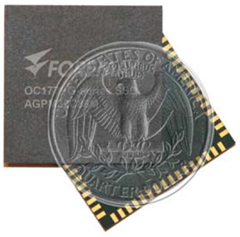 Foremay’s delivery just happens to be around the same time as the delivery of the iPhone 5. If the iPhone 5 DOES come with 64GB of capacity but it is traditional flash storage, watch out for ultra fast mobile devices comparing their much higher IO storage to that of the iPhone.
Foremay’s delivery just happens to be around the same time as the delivery of the iPhone 5. If the iPhone 5 DOES come with 64GB of capacity but it is traditional flash storage, watch out for ultra fast mobile devices comparing their much higher IO storage to that of the iPhone.
I hope the iPhone 5 comes with larger, faster storage, and it seems this disk on a chip just might be a great solution.